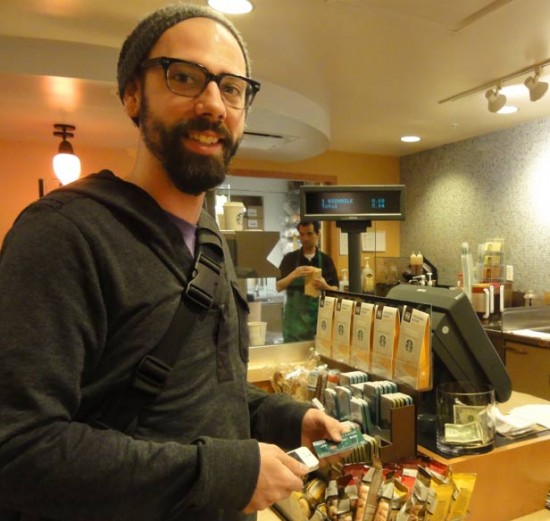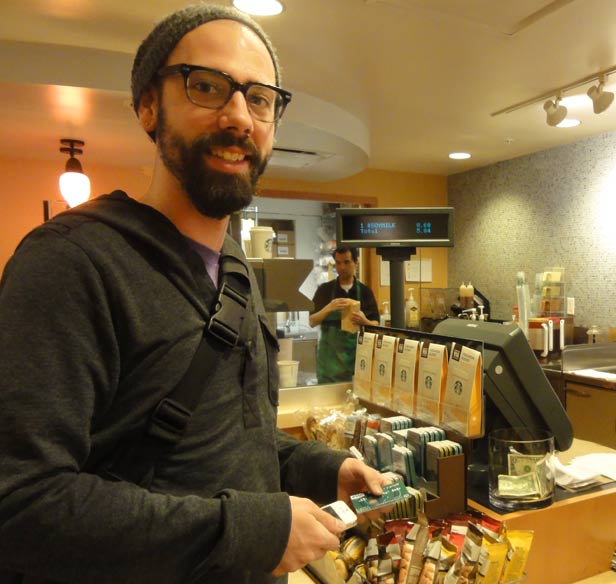Business Impact
With Mobile Internet, Money Is Up for Grabs
Ben Milne doesn’t look like a banker. Not one bit. So why shouldn’t he rebuild the world’s money system?



Ben Milne, a 29-year-old college dropout with a furry goatee and no background in finance, is on his second and third meetings with some of the world’s biggest banks.
He thinks he has convinced them he’s “not full of it.”
This is no small thing. The startup company he founded, Dwolla, has introduced an Internet-based payment system that aims to bypass credit card companies. Not only that, but to work properly, it will require rewiring a crucial hub of the U.S. financial system known as the Automated Clearing House, a network banks use to transfer payments electronically, although usually with a delay of several days.
Dwolla, which is based in Des Moines, Iowa, and employs just 20 people, may seem insignificant against the backdrop of $4 trillion in credit and annual debit payments and $30 trillion that banks move through ACH each year. But Milne sees no reason why he can’t be the one to invent an “extremely fast, secure, real-time exchange” that solves some “totally screwed-up inefficiencies” in the banking system.
“The people that control the communication of value are at the banks. But where’s all the gold? It’s just numbers,” says Milne, who previously ran a successful online audio business.
The plan is brazen, but Milne’s solution could be as good as any. In the United States, nobody has yet come up with a widely accepted way to pay the rent, or buy a coffee, from a mobile phone. Mobile payments are expected to grow explosively, but it’s still unclear how they’ll be carried out. Large retailers, banks, credit card companies, mobile-phone carriers, and Internet giants such as Google all have competing proposals but haven’t been able to agree on any standard approach.
Dwolla (think “dollar” plus “Web”) functions a bit like a prepaid debit card. You load money into a Dwolla account from your bank. Then you can instantly send money to any other Dwolla user by entering the person’s phone number, e-mail address, or Twitter handle into a phone app (or just a desktop computer).
A major advantage is the cost of that transaction: Dwolla charges 25 cents to receive a payment, and nothing for amounts under $10. That’s less than Paypal or credit card “swipe fees,” which can run 2 to 3 percent of a product’s price tag.
One merchant using Dwolla is Larry James Jr., the owner of the Mars Café in Des Moines, a coffee shop that’s a hub of the “Silicon Prairie” technology scene. James says he currently accepts a handful of Dwolla purchases every day on an iPod Touch, bypassing his “antiquated” cash register. He encourages people to use Dwolla. Even though the card fee on a latte may be just a few cents, those fees can add up to more than a thousand dollars a month.
Credit card companies are aware of Dwolla and similar efforts to undercut their business. “You can’t wake up in the morning without there being five or 10 more startups,” says Dan Schulman, a group president at American Express. He says there is a “tremendous amount of innovation going on in the payments industry,” some of it from small companies who are “thinking about it from the ground up.”
No payment system is useful unless it’s widely accepted. Compared with Amex, which has 50 million cards in circulation, Dwolla still has limited reach. The company says 80,000 people have signed up, and many use the service for personal transactions, like fund-raising from friends online. About 8,000 merchants also accept Dwolla, although the number outside the company’s home turf around Iowa is limited.
Dwolla plans to expand its network by courting other software companies. For example, Shopify, a company that sells software for online stores, recently began offering Dwolla as a payment option. Milne says if a company like Apple began using his network—say, for 99-cent purchases on iTunes—it could similarly avoid card fees.
“We’re evolving into a new payment behavior, which is based on your cell phone,” Milne says. “No one knows what kind of predominant behavior it’s going to be. For us, the goal is to build the ubiquitous platform that everyone can use.”
One problem that has dogged Dwolla is that loading money—by wiring it from a bank account—takes several days. That’s far from the instant satisfaction suggested by the term “digital cash.” In December, Dwolla took a step toward solving the problem by announcing that it would advance its customers up to $500 on demand if they paid it back within a month (a $3 fee applies).
Dwolla is working on a deeper fix to the problem—something Milne calls the company’s “real innovation.” Today, banks transfer money over ACH, an almost 40-year-old system that is run by the U.S. Federal Reserve and one private company. ACH is what makes it possible to deposit paychecks and pay utility bills electronically. The transfers are done in batches, which is why they often take three or four days.
Dwolla needs those transfers to go faster. Working with 16 institutions, mostly corn-belt credit unions, the company has deployed software it calls FiSync that it says will let ACH transfers go through nearly instantly using Web-based software. Recently, Milne has been pitching the idea to bigger banks as well. “If you get the banks, you become an unavoidable part of the stack. You become the Internet connection,” he says.
Dwolla’s ideas face skepticism. Marianne Crowe, a vice president at the Federal Reserve Bank of Boston, is doubtful that a startup with little experience in payments can improve on the network. “You are kind of duplicating what exists in the larger-scale banking structure,” she says. “I don’t think they necessarily understand what’s involved.” Milne says other Federal Reserve officials have visited Dwolla’s offices and are watching its progress.
For now, Dwolla employees are the darlings of Des Moines. This February, state officials sent over cookies after Dwolla raised $5 million in a funding round led by New York’s Union Square Ventures, also an early investor in the sites Twitter and Etsy.
Albert Wenger, a partner at Union Square who says he’s impressed by Milne’s fiercely independent views, uses Dwolla as a convenient way to pay tutors for his children. But is the firm using Dwolla’s payment network to relay any of the investment?
Perplexed for just a second, Wenger replied to the question: “That could have been a good idea.”